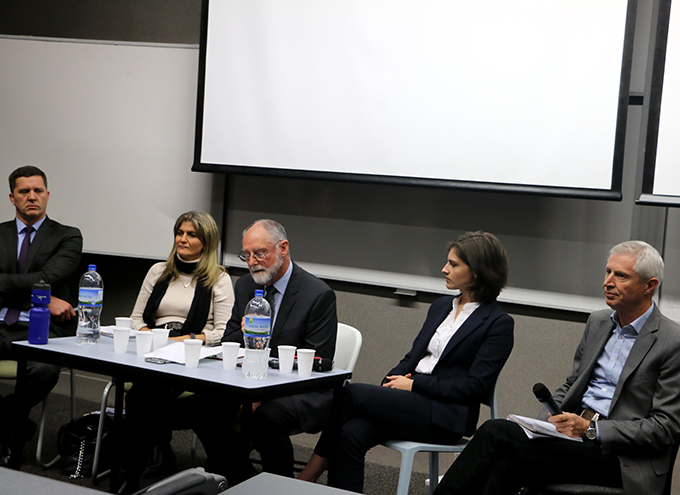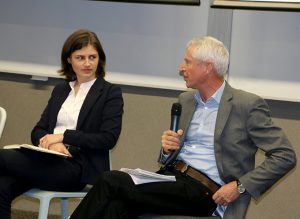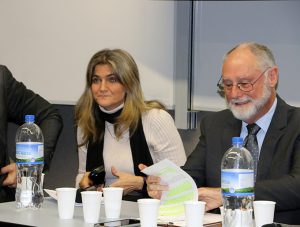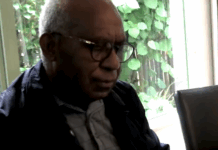
By Kendall Hutt in Auckland
Seasoned journalists and academics have warned “fake news” could invade New Zealand’s media if journalists do not remain vigilant.
“It’s about using those principles, experience and judgment built up over time ” said TVNZ’s One News political editor Corin Dann.
“That will more or less likely filter out fake news.”
Dann’s “Fake news and the 2017 General Election” fellow panelists Chlöe Swarbrick, moderator Dr Gavin Ellis, Dr Maria Armoudian and Mark Jennings also told the audience at the University of Auckland this week current trends in journalism worldwide — business models, rise of social media — were driving fake news.
“Clickbait rather than substance are at the heart of fake news,” Greens List MP Chlöe Swarbrick reflected.
Mark Jennings, the journalist behind the launch of Newshub during his 27-year tenure with MediaWorks and now a co-editor of the independent Newsroom, said “media getting sucked into matching” was the door for fake news.
“If the first one gets it wrong, then both get it wrong.”
‘Nowhere near as bad as the US’
If a media organisation was to accidentally publish fake news, Jennings said the organisation should address it “fast in a fulsome way”.
However, if fake news were to invade New Zealand’s political sphere, it would be “nowhere near as bad as in the US,” Jennings said.

Dr Armoudian, a lecturer in politics and international relations at the University of Auckland, explained this was because “here we still talk policy” while the US was witnessing a “polarised” and “personalised” invasion of politicians in the news.
“We’re seeing fake news as an extreme version of that.”
“We’re not going to suddenly get fake news,” Dann countered.
What New Zealanders might see, however, was “pressure” for information during elections.
It is important to remember, however, that fake news was not a new phenomenon, they stressed.
Fake news beyond ‘borders’
Dr Armoudian claimed the world had seen fake news during “manipulation” of the situation in a lead up to a coup in Chile in the 1970s because the US government “put newspapers on the payroll”.
“It’s very clear that fake news travels past Pacific oceans and borders.”

One audience member, Malcolm Evans, an award-winning independent cartoonist, agreed, saying that what the world was continuing to see was propaganda.
During a lecture at the University of Helsinki last year, Eddy Hawkins, an independent journalist with Finnish Broadcasting Company Yle reflected on the prevalence of disinformation, propaganda and fake news in the political sphere.
Hawkins noted disinformation had been hugely enabled by social media and the way media was currently consumed, namely “quickly and without question”.
“Be critical, analytical, beware of appeals to emotion masquerading as fact and logic,” he told the journalism and political students gathered.
The Auckland panelists, however, also identified a lower capacity for fact-checking in newsrooms due to the fact job-cuts had come about.
Fact-checking central
“We’ve lost some of the capacity for fact-checking,” Jennings admitted.
As a remedy to such occurrences, ABC in Australia has resumed a fact-checking service with the RMIT University journalism programme dubbed “RMIT ABC Fact Check.”
The Conversation also runs a fact-checking programming on its stories.
Swarbrick suggested part of the solution to fake news could be education.
“We need to see proper, informed citizens.
“Social media is the ‘Wild West’ at the moment, so it’s up to citizens to discern fake news.”
In closing Dr Ellis, a former New Zealand Herald editor-in-chief and now a senior lecturer in media and communication at the University of Auckland, reflected the “cure” may well be with citizens.
“We need to think with our head not our hearts. Think critically, not what we want to believe.”












































Extract from your story:
“Fake news beyond ‘borders’
Dr Armoudian claimed the world had seen fake news during “manipulation” of the situation in a lead up to a coup in Chile in the 1970s because the US government “put newspapers on the payroll”.”
Why presume that government-media collusion is a thing of the past?
Re the 4 April Syria Sarin Gas attack the following;
NZ news reports indicating that the Defence Minister and the Foreign Affairs Ministers supported the 6 April US retaliatory air- strikes – on what intelligence basis?
http://www.stuff.co.nz/national/politics/91348884/nz-given-prior-warning-of-syria-attackexpresses-understanding-of-us-action
http://www.nzherald.co.nz/nz/news/article.cfm?c_id=1&objectid=11834082
There is some subtly in the NZ Government press statement from Foreign Affairs Minister McCully where he fails to apportion blame to the Syrian Government or it’s forces, merely condemning the alleged gas attack and calling for an inquiry:
http://www.scoop.co.nz/stories/PA1704/S00033/nz-condemns-attack-in-syria.htm
Whereas the Labour leader Andrew Little knows who did it:
http://www.scoop.co.nz/stories/PA1704/S00101/labour-statement-on-syria.htm
Extracted quote by Andrew Little, “The world did need to express its outrage over this appalling act by the Syrian government…”
Bear in mind that Little has privileged access to some intelligence as senior opposition leader – part of the tradition or convention of attempting bipartisan support on matters relating to foreign policy and national security.
Here’s Professor Postol’s full report assessment with addendum:
http://www.unz.com/article/the-nerve-agent-attack-in-khan-shaykhun-syria/
Theodore
Postol – he’s no ‘conspiracy theory’ nutter.
Theodore A. Postol, professor emeritus of science, technology, and national security policy at MIT. Postol’s main expertise is in ballistic missiles. He has a substantial background in air dispersal, including how toxic plumes move in the air. Postol has taught courses on weapons of mass destruction – including chemical and biological threats – at MIT. Before joining MIT, Postol worked as an analyst at the Office of Technology Assessment, as a science and policy adviser to the chief of naval operations, and as a researcher at Argonne National Laboratory. He also helped build a program at Stanford University to
train mid-career scientists to study weapons technology in relation to defense and arms control policy. Postol is a highly-decorated scientist, receiving the Leo Szilard Prize from the American Physical Society, the Hilliard Roderick Prize from the American Association for the Advancement of Science, and the Richard L. Garwin Award from the Federation of
American Scientists.
Postol states the Western allies, particularly the US are ‘manufacturing’ the intelligence reports!
https://archive.org/details/WhiteHouseClaimsOnSyriaChemicalAttackobviouslyFalseProf.T
heodorPostolOfMIT
I’d be real careful about accepting the news media narrative on any story relating to foreign affairs and war. They appear to fall into line with the war party way to easily!
Comments are closed.